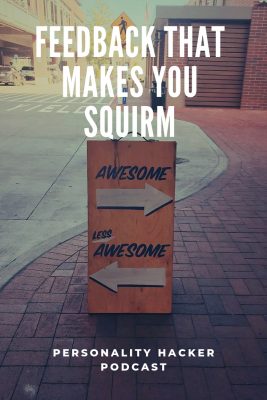Download Episode Here – right click link and select “Save Link As…”
In this episode, Joel and Antonia talk about how to use the feedback from others and from within to target unhealthy behaviors and beliefs, even if that feedback makes you squirm.
In this podcast you’ll find:
- Feedback is the willingness to accept information that the world gives us in order to respond and get the best results possible.
- Our resistance to receiving feedback we don’t like is often our ego being triggered.
- We see ourselves as better than we really are, and that’s a good thing. Confidence makes up for a multitude of sins.
- We rely on confidence so much that when the world gives us feedback to shake it, our ego can become distressed that we no longer have confidence to fall back upon.
- When we ignore feedback, we don’t give ourselves an opportunity to improve.
- When people are convinced they’re right, they especially ignore feedback.
- Listening to feedback doesn’t mean that you only listen to sources you deem credible or that you agree with.
- Giving feedback too much credence can also be dangerous. Individuals can be reflecting their subjective perspective, not necessarily ‘reality’.
- Feedback comes from both the ‘inner world’ and the ‘outer world’. We need a healthy balance of both.
- Introverts have a tendency to tune out feedback that doesn’t resonant with their inner world. This is great for dealing with nay-sayers, but not for changing course when needed.
- Extraverts, on the other hand, are more sensitive to outer world feedback but not to their internal feedback.
- “The best feedback is something that threatens a dearly held belief.”
- When our beliefs are challenged, we start to act like addicts for the belief(s).
- All growth happens in discomfort, so we have to be willing to accept uncomfortable feedback.
- Cognitive dissonance is when we experience stress because we are holding two opposing beliefs. We can avoid feedback because we don’t want to experience cognitive dissonance, but we need to be okay with feedback that may threaten a precious belief and remember “the way out is through.” There’s a part of you listening, anyway.
- Feedback will always challenge what you think, feel and where you stand.
Exercises we recommend in this podcast:
Make a list of between one and three pieces of feedback that make you feel the most uncomfortable (angry, frustrated, ashamed, sad, or makes you squirm). It will feel horrible, but your biggest growth is tied to that feedback. Even if you end up not agreeing with the feedback, exploring it is high leverage for self-understanding.
Things we reference in this podcast:
Podcast 08 – Smuggling Emotions
Blog post – What’s the REAL Difference between Introverts and Extraverts?
To subscribe to the podcast, please use the links below:
Subscribe with iTunes
Non iTunes Link
Download The Android App
Subscribe on Soundcloud
Subscribe with Stitcher
If you like the podcast and want to help us out in return, please leave an honest rating and review on iTunes by clicking here. It will help the show and its ranking in iTunes immensely! We would be eternally grateful!
Want to learn more?
Discover Your Genius Personality Type
We want to hear from you. Leave your comments below…



Share:
Podcast 0009 - How To Relate To Your Child's Different Personality
Podcast - Episode 0011 - What The Thinker Thinks - The Prover Proves
3 comments
As an INFP I kind of disagree about the part where you talked about introverts rather being able to tune out outer world feedback, than extroverts.
Actually, for me, inner and outer feedback are kind of interlaced, which makes it impossible to tune out either kind at any time. People sometimes tell me that I appear to be resistant to certain ways of feedback, but it’s never true. The opposite is the case. Every kind of feedback is highly personal to me and it constantly makes me question myself and makes me think about whether and to what extend it’s true. If I decide it to be valid and useful, I will try to make a change about it.
The thing about outer world feedback is that it usually just touches on something that I am already VERY painfully aware of about myself on the inside. Usually, I am already struggling with whatever it is that I receive as feedback from others. I already try really hard to improve in that matter, and sometimes I just haven’t been successful in the progress yet, which then makes me feel horrible about myself, every time others criticize it.
I know that being aware of something is a totally different thing than changing it. So even though I actually do value feedback, and I always want to see it as an opportunity, I just sometimes have a hard time to deal with feedback which does nothing but to constantly painfully raise the awareness that already exists inside of me. I usually don’t need to hear that something isn’t working. Feedback would be much more useful if it would provide some kind of help to get there faster. And if it doesn’t, it’s oftentimes just kind of draining. I want feedback, I consider feedback, I try to improve based on feedback. If I decide it to be useful.
So, as an introvert, I definitely can’t just stop listening to feedback. I can only decide afterwards, whether the feedback might be helping me to make a change, or whether it’s just poking a knife in an open wound. In the last case, I as an introvert may seem to be tuning out the feedback I’m receiving. But since outer world feedback is often just reflecting the inner feedback I already know, and since the inner world is, as you said, the real world to me, the outer feedback tends to always hurt me and I always have to actively sort out whether I think it’s valid, or not.
I’m just writing this, because I can’t really see an introvert-extrovert split when it comes to
Hi
I am an introvert and believe what i think about myself is the truth about me. I tried taking in feedback from my then significant other and it just bombed. I came across the word gaslighting that fit what happened to me after I broke with him. I had to go back into my own world to rediscover myself. But now I am resistant to any external feedback. So my question is how do take in feedback without losing who I believe I am.
I’m stymied in my personal growth and get stuck in a shame loop because I’m not at Maslow’s 5th level all the time (because it’s a moment-by-moment check-in system, not a developmental model like Spiral Dynamics). I would say that this episode of your podcast is the hardest type of feedback for me to receive, actually. The ENTIRE time I’ve been listening to this I’ve been trying to tune you out while I’m working on writing a pattern I’m designing because I’m super uncomfortable right now. I have books like Emotional Intelligence, The Wisdom of the Enneagram, and a few others which are my go-to “bibles” on how to keep moving forward. But for several years it wasn’t enough (until a few months ago when I started getting back into delving deep) and I felt stagnated. I LIKE my “rut” that I’ve dug for myself. I know what will happen if I do certain things and can stay in my safe zone. I do NOT like being stagnated, though. I want to grow and be better. Then when I try to, I start to think about the circular rut I’ve dug and how it can often feel pathetic (based on ego and attracting a mate, especially) but the feedback from my “hero circle” (drama dynamic) makes me feel like a victim or villain again. Then I get stuck on the shame and fear tracks which feed each other.